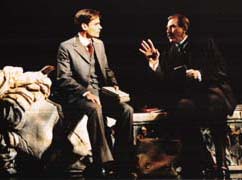
KOMISAR'S CURTAIN-RAISERS
by Lucy Komisar

|
|
| The Invention of Love--Robert Sean Leonard Richard Easton. Photo: ŠPaul Kolnik. | |
"The Invention Of Love" by Tom Stoppard
directed by Jack O'Brien
Produced by Lincoln Center Theater Lyceum Theater
149 W. 45 Street
212-239-6200, 800-432-7250
Opened March 29, 2001
Reviewed by Lucy Komisar April 20, 2001.
"The Invention of Love" is an intense, complex, compelling play that at one moment engrosses us in lectures on translations of Greek and Roman classical poetry and at another plumbs the intellectual joys and personal sorrows of A.E. Housman (1859-1936).
The English poet in his youth was secretly in love with one of his Oxford chums and failed to get his degree. It shows how the intellect can triumph even as the soul despairs. It also recounts the origins of the English law, revealed in this version to have been passed almost by accident, that made "indecency" between men a crime.
In this play about language, what stands out is Tom Stoppard's language as well as his masterful way of weaving the grand pursuits of the ages with the smaller longings and regrets of individuals. Director Jack O' Brien seems to orchestrate as much as direct the whole so the dreams fit seamlessly with the realities, adding even a bit of hokey vaudeville at just the right place to punctuate and puncture life's absurdity.
The premise is that the professorial, slightly officious Housman (trenchantly portrayed by Richard Easton) has died and gone to Hades where he is being pulled around in a small boat. That's quite appropriate for a classical scholar, considering the preoccupation of the ancients with the netherworld. Suddenly, he notices the arrival of a rowboat carrying three young men. One of them (acted with directness and sensitivity by Robert Sean Leonard) is the student Housman at Oxford. Through his remembering -- conveyed with clever literalness as the old man's conversations with his youth -- Stoppard depicts the development of the scholar, the poet and the man.
The playwright and the poet seek the origins of love in art and life. Three stacks of outsized books are piled high and topped with a Roman statue, a medieval gothic cathedral and a classical column. The scholars argue that the love poem was invented in Florence and Rome before Christ; no, in medieval times. There's a suggestion that if homosexuality wasn't invented in classical time, those societies ennobled it.
Academic disputes turn out to be also about behavior. The tutors and dons debate the validity of pure morality vs. existential art and life. Housman, an expert in the textual criticism of Latin and Greek poetry, explains that books were copied over by scribes who made mistakes and left versions with slight differences.
How can you figure out what the author really wrote? Who owns truth? And how easy it is for the triumph of dishonesty. One tutor defends translations that turn "he" into "she" in order to bowdlerize stories of homosexual love. Just when everything seems to be getting too devilishly serious, Stoppard turns devilishly witty. Talking about poetry, Housman complains that "responsibility for reading the meter seems to have been taken over by the gas company." The robed boatman in Hades orders him to "Look alive!" When the just deceased poet meets his younger self in memory, he declares, "I'm not as young as I was, whereas you of course are." Or, "Virtue is what women have to lose; the rest is vice."
The other main roles of Housman's school buddies are finely performed by Michael Stuhlbarg as a quizzical Alfred Pollard and David Harbour as the hail-fellow-well-met Moses Jackson. Daniel Davis does an exhilarating cameo turn as the tragic-comic Oscar Wilde.
The work is enhanced by Bob Crowley's simple but lush sets, which include scenes of Hades; a red and gilt theater; Waterloo Station with a train pulling out in a belch of smoke; and an outsized golden model of Westminster on which a parliamentarian and two editors lounge to discuss the new anti-sodomy law. At Crowley's Oxford, the trees are always red, the leaves are always falling, and the sky is full of stars.
After Oxford, Housman worked as a government clerk and spent his free time at the British Museum doing the classical study that would finally get him hired as a professor of Latin. His famous poem, "A Shropshire Lad" was self-published. [Komisar]
Theater critic Lucy Komisar gives pre-show briefings and post-show discussions for theater parties to enrich playgoers' experiences. She'll also help find an appropriate show and make or advise on arrangements. Interested parties may telephone (212) 929-1610 for information.
| museums | recordings | coupons | publications | classified |